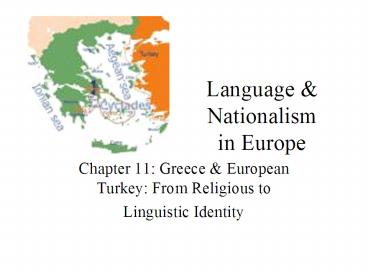Language - PowerPoint PPT Presentation
1 / 20
Title:
Language
Description:
... borders of Greece to include ALL Greeks. Many Greeks outside Greece did not ... Serbia & Bulgaria feared that Greece would engulf them too, all three battled ... – PowerPoint PPT presentation
Number of Views:96
Avg rating:3.0/5.0
Title: Language
1
Language Nationalism in Europe
- Chapter 11 Greece European Turkey From
Religious to - Linguistic Identity
2
Overview
- Ethnic identities based on culture and religion
have been transformed to territorial identities
marked by language
3
Greece
- Greece was part of Turkish Ottoman Empire for
approx 400 years, 15th - 19th c - Phanariot Greeks in Constantinople served as
interpreters and gained some control over Turkish
foreign policy within Ottoman Empire, Greeks
governed Romania, Moldova - Many Balkan Orthodox were considered Greek by
culture, since religion was more important than
language - Greek travelers/traders spread Greek culture
4
Greece, contd.
- After 11 years of war, and with help from
Britain, France, and Russia, Greeks became
independent of the Turks in 1832 - Turks were expelled and many Greeks returned from
abroad
5
Megali Idea (aka irredentism)
- The idea was to expand the borders of Greece to
include ALL Greeks - Many Greeks outside Greece did not support the
idea - But Greece did grow in expansions in 1864, 1881,
1913, 1920, 1947 - Serbia Bulgaria feared that Greece would engulf
them too, all three battled over Macedonia
1912-1913 - After expansion, compulsory population exchanges
based on religion - Greece now includes many non-Greeks, diaspora
still exists too
6
(No Transcript)
7
Greece today
Greece in 1920
8
Greek language
- The only surviving member of its branch of I-E,
has no close relatives a unique orthography, is
an unambiguous identifier of ethnicity - Distinct dialects
- Tsakonian (now waning) in E. Pelopennese
- Pontic in Turkey
9
(No Transcript)
10
Competition between two Greek Standards
Katharevousa vs. Dhimotiki
- Diglossia when Greece became independent
Byzantine Greek was the written language, the
spoken language was not written - Possible solutions
- 1) Keep Byzantine Greek as literary language
- 2) Return to Ancient Greek for both literary and
spoken language - 3) Promote spoken language to literary status via
purification, creating Katharevousa, with mixture
of Ancient, New Testament, Byzantine, spoken
Greek - Just use spoken language -- Dhimotiki, this koine
became dominant in Athens, used by Ionian poets
11
More on Katharevousa vs. Dhimotiki
- Phanariot Greeks in government instituted
Katharevousa as official language, though it was
felt very artificial and problematic - Since 1909, language policy favoring Katharevousa
vs. Dhimotiki changed NINE times - Since 1976 Dhimotiki only, Katharevousa has now
disappeared
12
Even more on Katharevousa vs. Dhimotiki
- Katharevousa associated with glorious Ancient
past, Megali Idea, Hellenic identity, closer to
language used in Church - Dhimotiki associated with left-wing politics,
heretical, subversive, pro-Slav Romaic
identity
13
Ethnic Linguistic make-up of Greece today
- No real data, because no census since 1951 has
collected ethnic linguistic data - Anti-minority Greek nationalism prevails,
distortion of historical facts - Minority languages Ladino, Armenian, Balkan
Romance, Albanian, South Slavic languages, Turkish
14
Linguistic minorities in Greece
- Ladino used to be majority language in
Thessaloniki, but most speakers exterminated by
Nazis - Armenian was also once common in Thessaloniki,
but most speakers emigrated - Balkan Romance (Vlachs)
- Arumanian in Pindus mtns in Greece
- Megleno-Romanian in Macedonia
15
Linguistic minorities in Greece, contd.
- Vlachs, contd. -- very much assimilated into
Greek society, there are no attempts to promote
Vlach language or ethnicity Romanians tried to
claim Vlach as a dialect of Romanian Greeks
tried to forcibly expel Vlachs to Romania (WWII)
16
Linguistic minorities in Greece, contd.
- Albanian -- Greek Albanians do not feel connected
to Albania, they are Christians and identify with
Greece, in Greece their language is called
Arvanitika, suggesting it is distinct from
Albanian (although this is not so)
17
Linguistic minorities in Greece, contd.
- South Slavic languages -- Greeks treat Slavs with
greatest suspicion 6-7th c Slavs penetrate
Macedonia, Thrace, and Pelopennese in modern
times, Slavic languages are actively suppressed
in Greece use of name(s) Macedonia(n) very
controversial in Greece - Turkish in Greece -- 100s of thousands left
Greece 1821-1923, but many remained they are the
only minority in Greece with protected status
18
European Turkey
- Turkey created 1923
- Turkish is from the Turkic branch of Altaic
- 1929 conversion to Latin alphabet (from Arabic)
19
European Turkey, contd.
- Minority languages (concentrated in Istanbul)
- Jewish Ladino (some emigrated to Israel)
- Armenian (few left after 1915 massacre of 1.5M,
others emigrated to Soviet Armenia) - Greek (some remain in Istanbul and on two
islands)
20
Conclusions
- Religion used to be the strongest marker of
identity, but in the last two centuries it has
been surpassed by language































